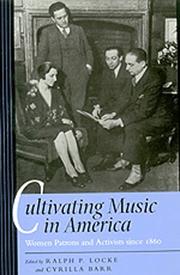| Listing 1 - 5 of 5 |
Sort by
|

ISBN: 0520083954 0585371865 Year: 1997 Publisher: Berkeley : University of California Press,
Abstract | Keywords | Export | Availability | Bookmark
 Loading...
Loading...Choose an application
- Reference Manager
- EndNote
- RefWorks (Direct export to RefWorks)
Women music patrons --- Music patronage --- Music --- Music, Dance, Drama & Film --- Music Literature --- History and criticism --- Business patronage of music --- Corporations --- Maecenatism --- Patronage of music --- United States --- 19th century --- 20th century --- Women music patrons - United States. --- Performing arts sponsorship --- Music patrons --- Women benefactors --- History and criticism.

ISBN: 0521825121 Year: 2003 Publisher: Cambridge, UK New York Cambridge University Press
Abstract | Keywords | Export | Availability | Bookmark
 Loading...
Loading...Choose an application
- Reference Manager
- EndNote
- RefWorks (Direct export to RefWorks)
Music --- Women music patrons --- Social aspects --- History --- History and criticism. --- History. --- Maria Theresa --- Contributions in music --- Austria --- Vienna (Austria) --- 18th century --- History and criticism --- 19th century --- Intellectual life --- 78.21.2 Wien --- 78.26

ISBN: 1580461336 9781580466523 9781580461337 9781580463331 Year: 2003 Volume: *4 Publisher: Rochester University of Rochester Press
Abstract | Keywords | Export | Availability | Bookmark
 Loading...
Loading...Choose an application
- Reference Manager
- EndNote
- RefWorks (Direct export to RefWorks)
Music patrons --- Music --- Mécènes de la musique --- Musique --- Biography. --- History and criticism --- Biographies --- Histoire et critique --- Polignac, Winnaretta, --- Mécènes de la musique --- Art --- anno 1900-1999 --- France --- United States --- Polignac, Winnaretta --- Biography --- Singer, Winnaretta --- United States of America --- Book
Book
ISBN: 178327669X 9781783276691 1800104340 1800104359 9781800104341 Year: 2022 Publisher: Woodbridge : The Boydell Press,
Abstract | Keywords | Export | Availability | Bookmark
 Loading...
Loading...Choose an application
- Reference Manager
- EndNote
- RefWorks (Direct export to RefWorks)
Patrons have long appeared as colorful, exceptional figures in music history, but this book recasts patrons and patronage as creative forces that shaped the sounds and meanings of new French music between the world wars. Far from mere sources of funding, early twentieth-century patrons collaborated closely with composers, treating commissions for new music as opportunities to express their own artistry. Patrons developed new pathways to participate in music-making, going beyond commissions to establish ballet companies, manage performance venues, and establish state programs. The impressive variety of patronage activities led to an explosion of new music as well as new styles and -isms, indelibly marking the repertoire that this book examines, including a number of pieces frequently heard in concert halls today. In addition to offering new perspectives on well-known French repertoire, this book challenges conceptions of patronage as a bygone phenomenon. Complementing a dwindling cast of aristocratic patrons were new ranks of music publishers, impresarios, state bureaucrats, opera directors, and others capitalizing on their savings, social connections, and artistic vision to bring new music into the world. In chapters on French discourse around patronage, aristocratic commissions, the stimulus provided by the interwar dance craze, music publishing, the Paris Opéra, state intervention in French musical life, and transatlantic musical exchanges, the book blends cultural history with primary source study and music analysis. It not only improves our understanding of French musical life and culture during the early twentieth century but also supplies us with essential insights into the ways modern music emerged at the intersection of music composition, aesthetic and national politics, and the creative labor of patrons.
Music patronage --- Music patrons --- Music --- History --- History and criticism. --- History and criticism --- Patrons, Music --- Benefactors --- Business patronage of music --- Corporations --- Maecenatism --- Patronage of music --- Performing arts sponsorship --- 1900-1999 --- France. --- Bro-C'hall --- Fa-kuo --- Fa-lan-hsi --- Faguo --- Falanxi --- Falanxi Gongheguo --- Farans --- Farānsah --- França --- Francia (Republic) --- Francija --- Francja --- Francland --- Francuska --- Franis --- Franḳraykh --- Frankreich --- Frankrig --- Frankrijk --- Frankrike --- Frankryk --- Fransa --- Fransa Respublikası --- Franse --- Franse Republiek --- Frant͡ --- Frant͡s Uls --- Frant͡sii͡ --- Frantsuzskai͡a Rėspublika --- Frantsyi͡ --- Franza --- French Republic --- Frencisc Cynewīse --- Frenska republika --- Furansu --- Furansu Kyōwakoku --- Gallia --- Gallia (Republic) --- Gallikē Dēmokratia --- Hyãsia --- Parancis --- Peurancih --- Phransiya --- Pransiya --- Pransya --- Prantsusmaa --- Pʻŭrangs --- Ranska --- República Francesa --- Republica Franzesa --- Republika Francuska --- Republiḳah ha-Tsarfatit --- Republikang Pranses --- République française --- Tsarfat --- Tsorfat --- Artistry. --- Composers. --- Cultural History. --- French Music. --- Interwar France. --- Modernist Composers. --- Music Making. --- Music Patronage. --- Musical Styles.

ISBN: 1580463339 1281741159 9786611741150 1580466524 1580461336 Year: 2003 Publisher: Rochester, NY : University of Rochester Press,
Abstract | Keywords | Export | Availability | Bookmark
 Loading...
Loading...Choose an application
- Reference Manager
- EndNote
- RefWorks (Direct export to RefWorks)
The American-born Winnaretta Singer (1865-1943) was a millionaire at the age of eighteen, due to her inheriting a substantial part of the Singer Sewing Machine fortune. Her 1893 marriage to Prince Edmond de Polignac, an amateur composer, brought her into contact with the most elite strata of French society. After Edmond's death in 1901, she used her fortune to benefit the arts, science, and letters. Her most significant contribution was in the musical domain: in addition to subsidizing individual artists (Boulanger, Haskil, Rubinstein, Horowitz) and organizations (the Ballets Russes, l'Op©♭ra de Paris, l'Orchestre Symphonique de Paris), she made a lifelong project of commissioning new musical works from composers, many of them unknown and struggling, to be performed in her Paris salon. The list of works created as a result is long and extraordinary: Stravinsky's Renard, Satie's Socrate, Falla's El Retablo de Maese Pedro, and Poulenc's Two-Piano and Organ Concertos are among the best-known titles. In addition, her salon was a gathering place for luminaries of French culture such as Proust, Cocteau, Monet, Diaghilev, and Colette. Many of Proust's memorable evocations of salon culture were born during his attendance at concerts in the Polignac music room. Sylvia Kahan brings to life this eccentric and extravagant lover of the arts, whose influence on the 20th Century world of music and literature remains incalculable.
Music patrons --- Polignac, Winnaretta, --- Patrons, Music --- Benefactors --- De Polignac, Edmond, --- De Polignac, Winnaretta, --- De Scey-Monbéliard, Winnaretta, --- Monbéliard, Winnaretta de Scey-, --- Polignac, Edmond, --- Scey-Monbéliard, Winnaretta, --- Singer-Polignac, Winnaretta, --- Singer, Winnaretta Eugénie, --- France. --- Bro-C'hall --- Fa-kuo --- Fa-lan-hsi --- Faguo --- Falanxi --- Falanxi Gongheguo --- Farans --- Farānsah --- França --- Francia (Republic) --- Francija --- Francja --- Francland --- Francuska --- Franis --- Franḳraykh --- Frankreich --- Frankrig --- Frankrijk --- Frankrike --- Frankryk --- Fransa --- Fransa Respublikası --- Franse --- Franse Republiek --- Frant͡ --- Frant͡s Uls --- Frant͡sii͡ --- Frantsuzskai͡a Rėspublika --- Frantsyi͡ --- Franza --- French Republic --- Frencisc Cynewīse --- Frenska republika --- Furansu --- Furansu Kyōwakoku --- Gallia --- Gallia (Republic) --- Gallikē Dēmokratia --- Hyãsia --- Parancis --- Peurancih --- Phransiya --- Pransiya --- Pransya --- Prantsusmaa --- Pʻŭrangs --- Ranska --- República Francesa --- Republica Franzesa --- Republika Francuska --- Republiḳah ha-Tsarfatit --- Republikang Pranses --- République française --- Tsarfat --- Tsorfat --- Cocteau. --- Colette. --- French culture. --- Paris salon. --- Proust. --- Ravel. --- Singer Sewing Machine fortune. --- Stravinsky. --- Winnaretta Singer-Polignac. --- arts. --- letters. --- musical domain. --- musical works. --- organizations. --- salon culture. --- science. --- subsidizing artists.
| Listing 1 - 5 of 5 |
Sort by
|

 Search
Search Feedback
Feedback About UniCat
About UniCat  Help
Help News
News